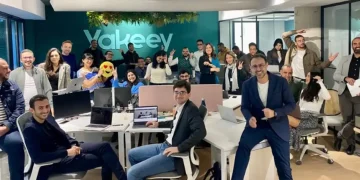A Journey to Nairobi’s Tech Frontier
I’m en route from Dubai to Nairobi for the Africa Tech Summit, a conference focused on a broad range of emerging technologies, forward‐thinking policies, and promising startups shaping the continent’s future. While the event isn’t exclusively dedicated to artificial intelligence, AI remains a crucial point of discussion. Across Africa, AI is already transforming sectors like healthcare and agriculture, and governments, industry leaders, and entrepreneurs are eager to showcase innovative solutions that tackle local challenges in sustainable, impactful ways.
Government Officials in the Spotlight
One of the most notable public figures championing AI on the continent is Nigeria’s Minister of Communications and Digital Economy, Bosun Tijani. Despite facing critics who argue that Africa has bigger concerns, Tijani firmly believes that investing in artificial intelligence will ultimately help address the continent’s most urgent problems.
In line with his stance, several African governments are beginning to reshape their tech strategies. Some are drafting dedicated AI policies, while others integrate AI development into broader digital transformation agendas. Officials in Ghana and Kenya, for example, have launched pilot programs to test how machine learning can improve public services—everything from processing routine paperwork to predicting drought patterns.
But it’s not just about government‐level ambitions. Many in Africa’s public sector see AI as a gateway to leapfrogging traditional development barriers—provided they can create the right environment for startups to thrive. This means revising outdated regulations, funding local incubators, and ensuring that issues like data sovereignty remain front and center.
Zain Verjee: A Call for Bold Reinvention
In a recent interview,I had ahead of the Africa Tech Summit, Zain Verjee—former CNN journalist turned AI entrepreneur highlighted the need for Africa’s tech community to “reimagine itself” in the face of rapid, global AI advances. Her company, TheZVG, and offshoot, Rundown Studio, focus on Africa‐centric AI storytelling and products.
“We can’t keep listing what Africa doesn’t have,” she says. “We need to harness the resources we do have—our talent, data, and unique perspectives—to innovate on our own terms.”
Verjee also underscores the critical role of governments in giving young entrepreneurs the platform and funding they need to succeed, noting that the excitement around AI won’t automatically translate into opportunity unless policymakers step up.
Opportunities and Challenges: The Role of Local Talent
According to multiple forecasts, the global AI economy is on track to generate trillions of dollars in growth, yet Africa currently accounts for only a small portion of that market. One key factor is the limited investment in local AI research and development. Meanwhile, global players continue to surge ahead: OpenAI recently unveiled its “Stargate” initiative at the White House, underscoring the United States’ push to stay competitive against China’s rapidly expanding AI sector. In parallel, the open‐sourcing of DeepSeek shows how lean, agile teams can achieve remarkable breakthroughs at a fraction of traditional costs. Despite these advancements, African startups still face significant hurdles—especially around funding, mentorship, and access to specialized hardware—leaving much of the continent’s potential in AI unrealized.
Nonetheless, success stories are emerging:
- Agritech AI: Startups using machine learning to predict weather patterns and manage soil health, aiming to boost crop yields in rural communities.
- Healthcare Innovations: Companies developing low‐cost diagnostic tools that can run on smartphones or lightweight devices, addressing diseases prevalent in African regions.
- Finance and Inclusion: Platforms using AI to identify creditworthy borrowers and reduce fraud, thus expanding financial services to underserved populations.
Government initiatives—like “AI for Africa” hackathons and grants—are starting to give local innovators more visibility. Meanwhile, private‐sector programs are also on the rise: Google for Startups’ AI First Accelerator, alongside a $5.8 million commitment to expand AI skills initiatives across Sub‐Saharan Africa, aims to empower individuals and organizations to leverage AI for economic growth and social impact. Strategic initiatives like Nigeria’s AI Collective—backed by a $1.5 million commitment from Luminate launched as a community of practice bringing together experts from civil society, academia, and the tech sector to ensure AI is developed and applied responsibly.as well as also disbursing a ₦100 million AI Fund in collaboration with Google, designed to boost AI‐driven Nigerian startups. In Kenya, for example, policymakers have also shown interest in creating a streamlined registration process for AI enterprises, reflecting an understanding that regulation should enable, not stifle, emerging technologies.
Data Sovereignty: Guarding Africa’s Digital Gold
A recurring theme—emphasized by both Bosun Tijani and Zain Verjee—is data sovereignty. As AI relies heavily on data for training, African policymakers and entrepreneurs alike are wary of ceding control of locally generated information to foreign entities.
“African nations should avoid selling their data,” Verjee stresses. “We need to digitize and structure our data in local, context‐driven environments.”
This means moving beyond mere data collection and creating domestic frameworks and regulations that ensure data remains on the continent, feeding locally built AI models that accurately reflect African languages, cultures, and needs. Several countries are now discussing data legislation that could restrict cross‐border transfers without clear benefits returning to African communities.
Preview of the Africa Tech Summit
Against this backdrop, anticipation is high for the Africa Tech Summit in Nairobi. Attendees hope to see:
- AI Startup Showcases
Young companies delivering solutions to uniquely African challenges—from real‐time market data for farmers to advanced translation models supporting local languages. - Policy Announcements
Fresh commitments from governments—potentially including frameworks for AI oversight, funding pledges, or pilot projects demonstrating AI’s public‐sector potential. - Collaborations and Partnerships
Multinational firms exploring co‐creation with African developers, academic institutions presenting cutting‐edge research, and regional alliances forming to share resources. - Investor Interest
A chance for global and pan‐African venture capitalists to meet promising founders and seed the next generation of AI success stories.
Amid the excitement, questions remain about who will lead the way and how quickly tangible outcomes can materialize. But there is no doubt that Africa is eager to stake its claim in the global AI landscape—not as a recipient of imported solutions but as a creator of technology with local roots and global reach.
Looking to the Future
The path to Africa’s AI future, while bright, is also complex. Policymakers must balance the desire for rapid adoption with the responsibility to protect citizens’ data and ensure equitable access. Entrepreneurs must navigate funding gaps, while governments must work to unify AI strategies across borders.
Yet, as we gather in Nairobi for the Africa Tech Summit, optimism is growing that Africa can do more than catch up—it can lead. Individuals like Bosun Tijani have carved out space for AI at the highest levels of government, and industry leaders like Zain Verjee advocate for telling African stories through local data and cutting‐edge models.
Above all, the hope is that AI technologies will not only solve challenges unique to the continent but also empower communities with tools that reflect Africa’s richness and diversity. As planes land in Nairobi from Dubai and beyond, participants and observers alike will be looking to see how Africa can redefine what’s possible—on its own terms and for its own future.














